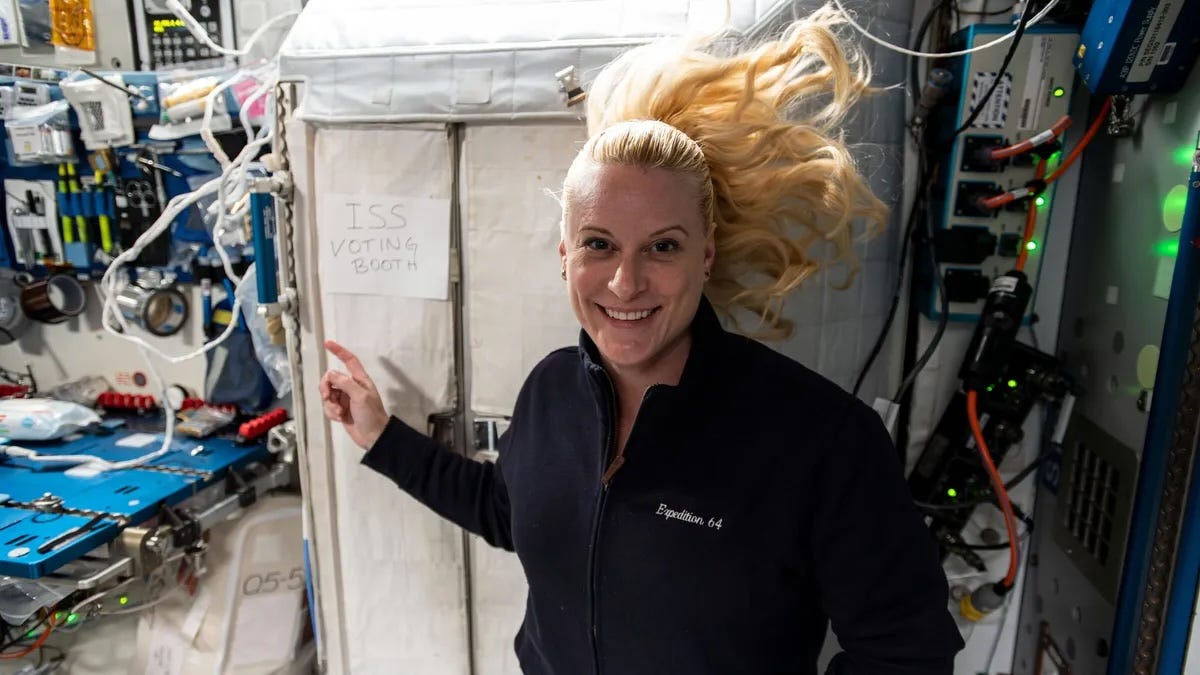
It’s Election Day in the U.S. today, and given how many of my newsletters (or chapters in my book) originally started from the question “How would [insert common activity in human society] be more complicated in space?”, I’ve been thinking about what voting in a space settlement might look like.
Space travelers have been casting votes from space since at least 1971, when the three crew members on board the Salyut 1 space station participated in the Soviet elections. For that vote and at least one other from the space station Mir in 1989, cosmonauts cast non-secret ballots by broadcasting them directly to ground control. By 2011, Russian crew members on the International Space Station were voting by proxy, a method also used by a French astronaut on the ISS in 2016 but one generally not available to American voters.
The first American who attempted to vote from space was unable to: astronaut John Blaha requested permission to vote in the 1996 election from Mir, but his state of residence, Texas, did not yet allow electronic voting. Texas passed a bill the following year allowing registered voters “who will be on a space flight during the early-voting period and on election day” to apply in advance and work through NASA to submit a secret ballot. Later in 1997, David Wolf became the first U.S. astronaut to vote from space. Today’s cosmonauts can now also vote electronically from space (as of 2020).
Proxy voting, early mail-in voting, or electronic voting works for space travelers on temporary expeditions today, but how will future voters participate in terrestrial elections if they’re on long-term or even permanent missions to space? Fortunately, the communication delays caused by the finite speed of light are unlikely to interfere with the transmission of votes back to Earth, as this wouldn’t require real-time conversation. Perhaps they’ll setup local polling sites like Australians in Antarctica did in 2019, designating members of the settlement as election workers who collect and then transmit the ballots. And as the population of residents in a space community grows, there may be a need for local elections to manage decision-making on issues that don’t need consultation with Earth.
To be honest, unlike many of the other aspects of human civilization that I’ve considered in space, it doesn’t seem like voting will need to change much, even in the harsh, isolated, artificial environment of a space settlement. After all, modern technology isn’t necessary for a process as basic as voting— it just helps manage elections for very large populations of voters, which won’t be an issue in space for some time.
The bigger concerns for future voters in space will be the legal and social components of the democratic process: ensuring that people living in space have the legal right and ability to vote, and that they are adequately represented by the governments that affect their lives. The struggle (and ultimate failure) of John Braha to vote in the 1996 election provides yet another cautionary tale where the technology existed to allow him to participate, but a lack of foresight on the legal side meant he was excluded from a basic right in society. In space, we’ll continue the ongoing fight for protecting both the security of elections AND the accessibility of voting for every eligible voter. We’ll bring that fight with us out into space, no matter where in the Solar System we end up.
Other News
My book, Off-Earth: Ethical Questions and Quandaries for Living in Outer Space, is now available in paperback! You can now read the book in paperback, hardcover, ebook, audiobook, and Mandarin Chinese (so I’m told— I haven’t found a purchase link for that last one yet).



